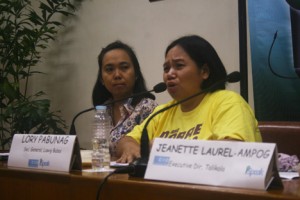
WOMEN TROUBLES. Lory Pabunag of Lawig Bubai gets emotional on Thursday when she narrated her previous life as a prostituted woman. She said poverty, government neglect and the lack of access to basic services push women to prostitution. (davaotoday.com photo by Alex D. Lopez)
By ALEX D. LOPEZ
Davao Today
DAVAO CITY, Philippines — “Textitution” is among the newest forms of prostitution, according to prostituted women’s group and nongovernment organizations that marked October 5 as International Day of No Prostitution.
During the regular I-speak press conference at the city hall of Davao City, Jeanette Laurel-Ampog, Talikala executive director, bared that this new type is done through phone sex in exchange for 300 to 500 pesos (USD 7-12) worth of load.
Laurel-Ampog also said there was a rise in cases of “swap-lat” or sex in exchange for shabu (methamphetamine hydrochloride), or sealant or rugby — the latter commonly used as cheaper alternatives to drugs.
When asked on the manner of monitoring prostituted women and minors engaged in prostitution, Lory Pabunag, secretary-general of Lawig Bubai, said her group is on the process of organizing these women.
“We have already organized some of these women and minors involved in these new kinds of prostitution. They told us their situation; some were already into drugs,” Pabunag said.
There are some 4,000 women and children in prostitution in this city, most of whom “work” in KTV bars, clubs, massage parlors and in the streets.
Talikala said the ages of women and children in prostitution range from 9 to 60 years old.
In a joint statement with the Lawig Bubay, Talikala added that most are out of school youth from urban villages in the city, while others are recruited from rural areas.
Talikala blamed poverty, the lack of opportunity to find decent employment and the absence of basic services for women and children as factors that push women and minors into prostitution.
She added that available employment for women and children are only contractual jobs that last for only five to six months. After their contracts expire, women are forced to hunt for jobs in establishments that do not require the women to have credentials save that they have a “pleasing personality.”
Laurel-Ampog cited that such establishments, bars and massage parlors, are usually fronts and are venues for prostituting women.
Advocacy groups admitted that intervention from concerned agencies is necessary in order to monitor and help these women who are engaged in new trends of prostitution.
“It is difficult to monitor them, they are considered freelancers unlike those in the KTV bars and massage parlors”, Pabunag added.
“We have positive laws such as the Magna Carta for Women and Children and the Women Development Code but the government does not have the political will to fully implement such policies,” Laurel-Ampog added.
Analou Calix, Chairperson of Lawig Bubai, added that the continued failure of the government to address the roots of the problem is a manifestation that it condones to such miserable situation of women and children in the country.
“Basic social services like education, housing and health are now being privatized and corporatized. How can ordinary families, especially women and children, cope up with the rising cost of basic commodities?” Calix lamented.
Lorna Mandin of the Integrated Gender and Development Office of the city government confirmed the rising cases of women and children that are into prostitution.
“Nagka-bata ug nagkadaghan (Victims are younger and their numbers are rising), ” Mandin said on Thursday’s regular press briefing.
She said her office is mandated to coordinate closely with non-government organizations in implementing interventions for women and children who are into prostitution. “They get occupational permit from the business bureau, not as prostituted women but as workers in entertainment industries,” she added.
Rise in HIV cases
Since majority of prostituted women are able to evade identification, it is difficult to check their health conditions. The women’s rights advocates also touched on the fear of the spread of Human immunodeficiency virus (HIV), which causes acquired immunodeficiency syndrome (AIDS).
AIDS may be acquired through sexually intercourse and the use of infected needles. The disease leads to the progressive failure of the immune system and is fatal.
Talikala and Lawig Bubai recommended the massive organizing of women involved in prostitution for proper and immediate intervention.
Recent report posted by davaotoday.com indicated the alarming increase of the number of persons infected by HIV in the city.
In line with the commemoration of the international day of no prostitution, Talikala and Lawig Bubai launched massive education campaigns to increase the awareness of the public on the real issues behind the problem of prostitution.
The groups also joined the call of the marginalized sectors for the Aquino government to prioritize social services especially to women and children.
In the joint statement, the advocacy groups called for the rechanneling of the government budget from debt servicing and militarization, to pour much needed funds for social services for the needs of women and children.
“Adequate social services, decent jobs, and accessible and quality education would mean the end of women and children being forced into prostitution,” the statement concluded. (Alex D. Lopez/davaotoday.com)










